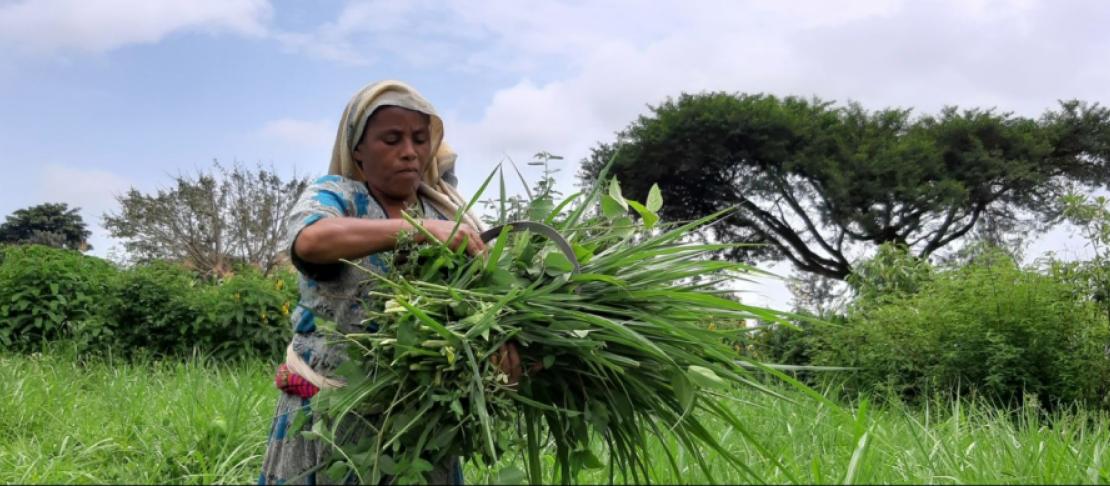For or against women empowerment? Views from men and women smallholder farmers in the Southern and Amhara regions of Ethiopia

This blog originally appeared on the ILRI blog.
Ethiopia is increasingly highly vulnerable to climate change. Farmers across different regions are dealing with climate variability and weather risks more and more. But one way to increase the climate resilience of livestock keepers is through small-scale irrigation, which can adapt small-scale livestock and fodder production, and in some cases transform livelihoods.
The Feed the Future Innovation Lab for Small-Scale Irrigation Project (ILSSI) has been working on irrigated fodder development in the mixed farming system of the Ethiopian Highlands. The ILSSI project validates and promotes sustainable small-scale irrigation technologies that fit well into smallholder farming systems, including labour-saving water-lifting technologies and forage genotypes. The goal is to enhance production of irrigated fodder in the smallholder farmer systems and help to alleviate frequent seasonal feed shortages.
However, what roles do women and men carry out regarding irrigated fodder? What are the effects on gender relations and women’s empowerment along the value chain? These questions have not been well studied. With support from the CGIAR Research Program on Climate Change, Agriculture and Food Security (CCAFS) and the CGIAR Research Program on Livestock (Livestock CRP), social scientists at the International Livestock Research Institute (ILRI) designed a qualitative study to explore how men and women farmers understand women’s empowerment, and the factors that support or inhibit women’s empowerment.
A total of 12 focus group discussions (FGDs) were conducted in July and August 2021 in the Amhara and Southern regions of Ethiopia. The FGDs included two groups of farmers who had encountered the technology package of improved forages and small-scale irrigation through a dairy cooperative. One group had decided to adopt the package, the other had decided against it. A third group was of farmers who were not members of a dairy cooperative and had not encountered the technology package. Six key informant interviews were also carried out with input traders, livestock product traders, and government officers in the same community.
Preliminary results
Analysis of the data is currently ongoing; however, preliminary results indicate that men’s empowerment is generally accepted as a good thing and a good standard. There seems to be a consensus between both men and women that empowered men are ideal. Disempowered men are seen as not having ‘the favour of God’ on their side, which is beyond comprehension. Empowered men are described as rich, wise leaders and mentors. They can be relied upon by their household members as well as the community for guidance and protection. When irrigating fodders, the empowered man is considered as ‘able to do all that is required and improve his fodder productivity’.
However, the empowerment of women is a contentious, almost controversial topic. Some men view women’s empowerment as a good thing, and link it to the woman being industrious and of orderly service to the family and the community. Nonetheless, she is still expected to be obedient to her husband and be aligned to the social norms that have been perpetrated by the community over time.
Some men view an empowered woman as a renegade who is going against the grain of the community’s culture, norms, and social relations. What is surprising is the fact that some women also view women’s empowerment as being disruptive of the community's 'order’ and they are at pains to ensure the status quo. These divergent views have led the community into propagating language and attitudes that can be termed as ‘social sanctions’ against women’s empowerment, shaming women who are considered empowered.
Despite this social pushback, there are a few women who still aim for their own empowerment in rural areas and livestock product marketplaces. From personal communication with the ILSSI team leader in Ethiopia, two of the three dairy cooperatives linked to the project are led by women ‘who are doing a great job and being innovative’.
A chairlady of a Kebele women’s association in Amhara region, who is also an adopter of small-scale irrigation and improved forages package, explained a shift in women’s participation in public spaces:
In the past women were expected to stay home and do domestic chores and support farming activities; there is a saying 'sete wede majet wend wede adebabay' which means 'women for home and men for the public.'
But we now see the Kebele administration promoting gender equality in sharing of responsibilities between men and women."
The ILSSI project aims to increase livestock productivity and improve household nutrition and gender equity through improved access to good-quality forages. Women's empowerment is a key factor in developing better interaction with small-scale irrigation of improved fodder technologies, which would enhance climate resilience in the short- and medium-term. The project team at ILRI is continuing to explore the data from this community to understand the issues surrounding the acceptance of women’s empowerment.
This article is co-authored by Esther Njuguna (ILRI), Rachel Gitundu (ILRI), Nelly Njiru (ILRI), Lenesil Asfaw (Consultant), Melkamu Derseh (ILRI) and Annet Mulema (IDRC).